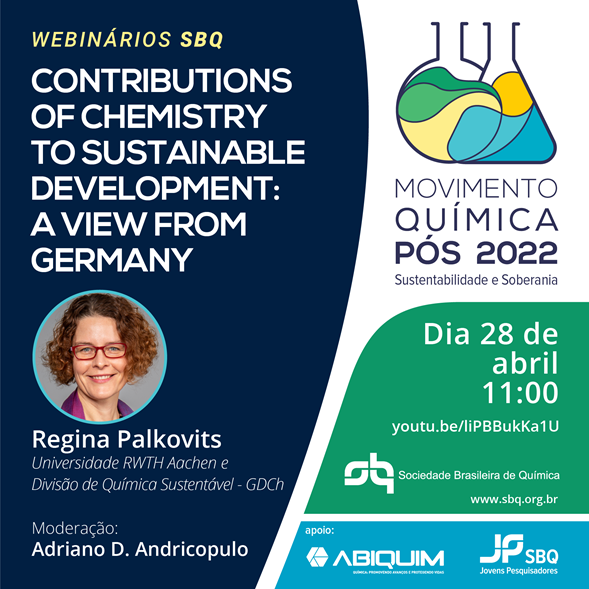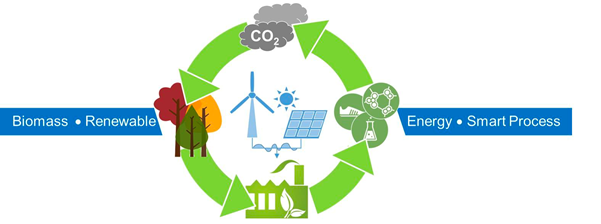20/04/2022
Webinários SBQ:
CONTRIBUTIONS OF CHEMISTRY TO SUSTAINABLE DEVELOPMENT: A VIEW FROM GERMANY

|
Regina Palkovits
Docente da Universidade RWTH Aachen (Alemanha)
Diretora da Divisão de Química Sustentável da Sociedade Alemã de Química (GDCh)
Moderação:
Adriano D. Andricopulo
Docente do Instituto de Física de São Carlos – USP
Presidente da SBQ (2014-2016)
28 de abril – 11:00 – youtu.be/liPBBukKa1U
Resumo:
Contributions of Chemistry to Sustainable Development: A View from Germany
The guidelines of sustainable development require a transformation of today's linear chemical industry with the aim of closed carbon cycles. In this process, renewable energy can be used as an energy/heating source and to provide chemical redox equivalents, e.g. in the form of hydrogen or electrons. Catalysts are essential to enable selective chemo-, bio-, or even electrocatalytic reactions under the dynamic supply of resources. As carbon sources, fossil raw materials must be used as efficiently as possible in a transition phase and consistently replaced by renewable carbon sources such as CO2 and biomass, as well as recycling streams, e.g. in the form of plastics. Catalysts enable raw materials that are highly diverse in functionality and reactivity to be selectively converted and efficient value chains to be developed aiming to realize overall energy-efficient carbon cycles. In particular, chemical energy storage molecules that allow transport and storage of renewable energy will gain importance and strengthen the coupling of the chemical and energy sectors.
In this webinar selected aspects of this transformation will be highlighted giving reference to several large-scale projects currently ongoing in Germany.

|
Sobre a conferencista:
Regina Palkvits é professora titular do Instituto de Química Técnica e Macromolecular da Universidade RWTH Aachen, da qual é docente desde 2010. Engenheira química pela Universidade Técnica de Dortmund (1998-2003), cursou o doutorado no Max-Planck-Institut für Kohlenforschung (2003-2006), realizou estágio de pós-doutorado na Universidade de Utrech (2007) e foi líder de grupo no Max-Planck-Institut für Kohlenforschung (2008-2010). Atua nos seguintes temas de pesquisa: catálise heterogênea e química técnica, valorização de biomassa, catálise ambiental, energia, e materiais de alto desempenho. Tem cerca de 200 artigos publicados. Na Sociedade Alemã de Química (GDCh), é a atual diretora da Divisão de Química Sustentável. Mais informações aqui.
A captação e transmissão dos Webinários SBQ conta com o apoio do JP-SBQ – Comitê Jovens Pesquisadores da SBQ.
A divulgação deste webinário tem o apoio da ABIQUIM – Associação Brasileira da Indústria Química e do JP-SBQ.
Os Webinários SBQ constituem uma das frentes do Movimento Química Pós 2022 – Sustentabilidade e Soberania (MQP2022), cujo objetivo é a promoção de reflexões sobre como a Química pode contribuir para a sustentabilidade e a soberania do Brasil. Mais detalhes no site do MQP2022.
Os vídeos dos webinários anteriores estão disponíveis na área da SBQ no YouTube.
|